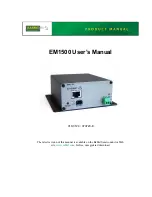
MIO–CCE–4K/3G
SMPTE ST 2110/4K/3G/HD/SD Closed Caption Encoder with Media–to–IP Streaming
Page - 74
Revision 1.0
•
Set the Port settings to match the settings in Hyper-terminal as shown above.
•
Press ENTER on the keyboard and ensure you see an asterix (*) prompt every time you push the
ENTER key.
•
If you do not see the asterix
(*) prompt, communication has not been established between the MIO-
CCE-3G/4K and PC. Begin from the beginning of this procedure and ensure all settings are correct.
•
At the prompt with the *asterix in Hyper-Terminal, type in the following command:
Ctrl + a (the control button on the keyboard plus the letter A button)
5
SPACE (space bar)
f
1
You will not see this displayed at the prompt.
•
Press the ENTER key
•
This Control A command is further outlined in section 6.3.4
•
All captions in field 1 should now be displayed in HyperTerminal.
•
To turn this feature off, type in the following command
•
CTRL + g (Control key on the keyboard and the G key)
•
The captions will stop scrolling
This test shows the MIO-CCE-3G/4K is processing captions and allows the user to verify this through
Hyper-Terminal.
If captions are not displayed, check the following:
•
Ensure the command was entered properly.
•
Are captions present in the upstream video?
•
Turn on the CEA-608 Test Message via VistaLINK
®
7.1.4.
There are No Captions Present Out of the ATSC Encoder
Make sure the correct communication cable is used between the MIO-CCE-3G/4K Port B and the ATSC
encoder. A null modem cable is used in almost all cases.
Avoid using gender changers, “home made” cables, or distribution boxes between the MIO-CCE-3G/4K
and ATSC encoder. Ensure a direct path is provided from the MIO-CCE to the encoder with a proper
working cable.
Ensure Port B is set to the proper protocol and baud rate using VistaLINK
®
menu.
Note: Only Port B supports SMPTE-333M and Grand Alliance protocol.





































